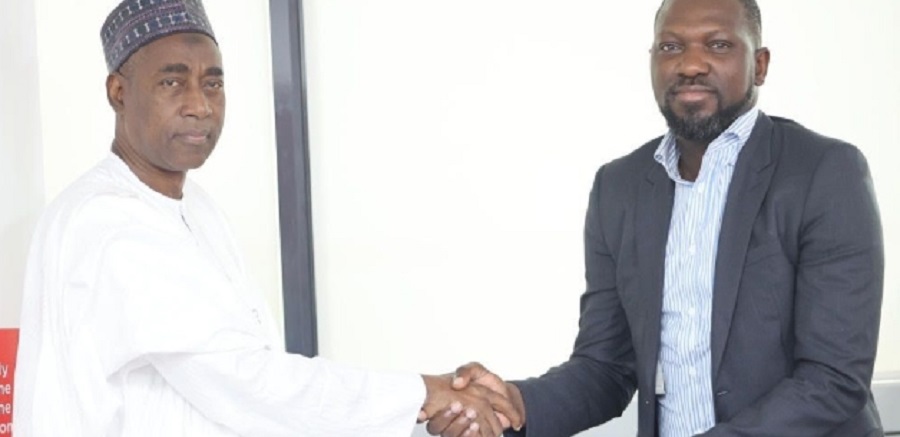News
EFCC, Flutterwave to Establish Cybercrime Centre for Security of Transactions

Economic and Financial Crimes Commission (EFCC) and Flutterwave, unicorn payments technology company have signed a Memorandum of Understanding (MoU), to establish and a state-of-the-art Cybercrime Research Centre.

Areas of focus of the centre include advanced fraud detection and prevention, policy development, as well as youth empowerment.
The fintech company with fortunes worth over $1bn headquartered in San Francisco with footprints in Nigeria and other African countries said the centre would also provide a “sustainable lifeline to youths across the country”.
To this effect, the Silicon Valley-based company signed a Memorandum of Understanding with the anti-graft agency in Abuja.
Ola Olukoyede, chairman, EFCC; Olugbenga Agboola, founder, Flutterwave; Christopher Gray, director of Federal Bureau of Investigations (FBI); and other senior officials from both the EFCC and the FBI witnessed the signing of the MoU
Specifically, the MoU was signed by Mohammadu Hammajoda, secretary, EFCC and Agboolaof Flutterwave.
Olukoyede said, “This partnership marks a significant leap forward in our efforts to combat financial crimes and ensure a secure financial landscape for Nigerians. The Cybercrime Research Centre will significantly enhance our capabilities to prevent, detect, and prosecute financial crimes.”
On his part, Agboola said, “This initiative underscores our commitment to creating a fraud-free financial ecosystem and leading the charge in safeguarding transactions across Africa.
“We applaud the EFCC’s relentless efforts to combat internet fraud and other illicit activities in the financial sector.”
The Cybercrime Research Centre, to be established at the new EFCC Academy in Abuja, would serve as a hub for advanced research, training, and capacity building in the fight against financial crimes.
Areas of focus of the centre include advanced fraud detection and prevention, collaborative research and policy development, youth empowerment and capacity building, technological advancement and resource enablement, among other key areas.
“Advanced Fraud Detection and Prevention: Developing and implementing cutting-edge technologies to detect and prevent financial fraud. The centre will offer comprehensive training for law enforcement and industry professionals to combat modern financial crimes effectively.
“Collaborative Research and Policy Development: Engaging in joint research initiatives and policy formulation to enhance the understanding and regulation of financial crime. The centre will provide a platform for the exchange of ideas and best practices between the public and private sectors.
“Youth Empowerment and Capacity Building: Providing high-end training and research opportunities for 500 youths, equipping them with the skills needed to navigate and excel in the digital economy.
“Technological Advancement and Resource Enablement: Creating a repository of advanced tools, technologies, and resources to support financial crime investigations, including protocols for addressing emerging threats such as cryptocurrency-related crimes,” the statement concluded.
Birthed in 2016 by Agboola, fondly referred to as GB, Flutterwave, with its corporate headquarters in San Francisco and operational head office in Lagos State, grew within a short time, penetrating the African market with customisable payments applications through its unique Application Programming Interface.
News
Stakeholders Demand Stronger Governance and Infrastructure to Drive Tech Adoption @ Lagos AI Summit

As AI adoption accelerates across Nigeria, leaders at the “AI in Action Now” conference 2026 have called for a balance between rapid innovation and strict regulatory governance. The event, held at the Lagos Oriental Hotel, highlighted both the doggedness of Nigerian builders and the risks of unregulated data usage.

Dotun Adeoye, Co-Founder of AI Nigeria, raised alarms over “Shadow AI”, a trend where employees upload sensitive official documents to public AI platforms. He praised the Nigerian Data Protection Commission (NDPC) for its recent aggressive stance, including multi-million-dollar fines against major banks and social media brands.
“Innovation without governance is dangerous. The regulator now has the job of educating players. We are working in partnership with them to ensure players don’t just get fined, but actually understand how to protect data locally rather than storing it abroad, ” Adeoye noted.
Addressing issues of lack of infrastructure to carry AI adoption, Conference Convener Debola Ibiyode admitted that while Nigeria lacks the traditional foundation for AI adoption, the tech community cannot afford to wait.

“The simple answer is we don’t have the infrastructure, but Nigeria has never really had infrastructure to drive anything, and we still thrive, ” Iboyode said, encouraging students and builders to look beyond current limitations. “Once we start to build based on what we have now, it will encourage those who need to provide the infrastructure to do their part. The world will not wait for us,” she insisted.
To bridge this gap, she highlighted the AI Foundry Africa, an incubator designed to mentor ideas into market-ready products.
Meanwhile, speaking to journalists on the sidelines, Biodun Ogunleye, the Lagos State Commissioner of Energy and Mineral Resources, echoed the sentiment that the government’s role is to facilitate the right environment through partnership. He emphasized that data generated from interactions with the government must have long-term value.
“We must ensure that in all facets from production to interaction with government, the tools required to ensure data has value are appreciated,” Ogunleye stated.
He concluded that through private-sector collaboration, the government can focus on its primary functions while leveraging AI to ensure the nation aspires for the future.
News
35 Million Nigerians Face Acute Hunger in 2026, UN Warns

About 35 million Nigerians face acute hunger risks in 2026, including three million children battling severe malnutrition, the United Nations has warned, attributing the crisis to collapsing global aid budgets and escalating violence in the northeast.

UN Resident and Humanitarian Coordinator Mohamed Malick Fall disclosed this on Thursday during the launch of the 2026 humanitarian plan in Abuja, noting that the traditional foreign-led aid model proves unsustainable amid Nigeria’s escalating needs.
He highlighted dire conditions in Borno, Adamawa and Yobe states, where over 4,000 people perished in the first eight months of 2025 from surging suicide bombings and attacks—equalling the entire previous year’s toll.
The UN now targets $516 million to deliver lifesaving aid to 2.5 million people this year, a sharp drop from 3.6 million in 2025 and half of prior levels, forcing prioritisation of only the most critical interventions.
Fall stressed, “These are not statistics. These numbers represent lives, futures and Nigerians,” as shortfalls last year compelled the World Food Programme to halt support for over 300,000 children after resources dried up in December.
Yet, Fall acknowledged Nigeria’s increasing national ownership, including local funding for lean-season food assistance and proactive flood early-warning systems, signalling a shift toward self-reliant crisis response.
News
NITDA Commits to Digital Inclusion for Persons with Disabilities

The National Information Technology Development Agency (NITDA) has reaffirmed its commitment to inclusive digital development following the completion of a two-day digital literacy training for persons with disabilities (PWDs) in Abuja.

The programme, organised under NITDA’s Digital Literacy for All (DL4ALL) initiative, the programme trained 50 participants in practical digital skills to enhance their participation in Nigeria’s expanding digital economy.
In his remarks, the Director-General, Kashifu Inuwa CCIE, stated that the programme reflects the agency’s determination to ensure accessibility remains a core component of national digital transformation efforts.
He explained that genuine digital advancement cannot be realised without the inclusion of persons with disabilities, adding that millions of Nigerians remain constrained by limited access to accessible and inclusive digital platforms.
“In many cases, the problem is not the absence of digital tools but the lack of accessibility. Platforms that do not support assistive technologies, non-captioned content and inaccessible websites effectively shut people out and limit opportunities,” he added.
Inuwa further explained that the initiative aligns with President Bola Ahmed Tinubu’s Renewed Hope Agenda, which prioritises inclusivity as a driver of national development. He stressed that persons with disabilities should be recognised as active contributors to economic growth rather than dependants.
“When equipped with the right skills and technologies, persons with disabilities become innovators, entrepreneurs and professionals who contribute meaningfully across sectors,” he added.
He acknowledged the role of Inclusive Friends Association (IFA) and SIMBED in delivering the training, describing the collaboration as a model of how government and civil society partnerships can advance inclusive development.
Highlighting NITDA’s broader digital literacy drive, the Director-General said the DL4ALL programme is a key component of the agency’s Strategic Roadmap and Action Plan, which targets 70 per cent digital literacy by 2027 and 95 per cent by 2030.
He explained that the initiative operates through three main tracks: an informal sector programme that has trained more than 480,000 Nigerians across 30 states and the Federal Capital Territory since September 2024; an education sector programme focused on embedding digital skills into learning institutions; and a workforce readiness programme designed to strengthen digital competence in both public and private sectors.
“This programme is not merely a pilot. It is proof that inclusive and intentional training works, and that persons with disabilities can excel when given equal opportunities,” Inuwa stated.
Also speaking, the Managing Director and Chief Executive Officer of SIMBED, Mr Daniel Onunkwo, described the training as a significant step towards closing the digital inclusion gap for persons with disabilities.
Onunkwo added that the initiative sends a strong message about equity and national progress, adding that SIMBED remains committed to expanding digital empowerment for persons with disabilities.
Similarly, the Executive Director of Inclusive Friends Association, Grace Jerry, represented by Tracy Agbamu, commended NITDA for demonstrating intentional leadership in promoting inclusion under the Renewed Hope Agenda.
She urged participants to continue applying the skills acquired and to serve as digital inclusion advocates within their communities.
The training programme further strengthens NITDA’s vision of building a digitally inclusive Nigeria where access to digital opportunities is determined not by physical ability but by empowerment and innovation.

 E-Financial2 days ago
E-Financial2 days agoZenith Bank Gets Regulatory Approval for Full Takeover of Paramount Bank

 Telecom2 days ago
Telecom2 days agoMTN Nigeria Suffers 9,218 Fibre Cuts in 2025 as Vandalism, Theft Cripple Network

 E-Business2 days ago
E-Business2 days agoFirm Detected a Fivefold Surge in QR Code Phishing Attacks in the Second Half of 2025

 Telecom2 days ago
Telecom2 days agoNew Investment Fund Targets Acceleration of Emerging Technology in Nigeria

 News2 days ago
News2 days agoNITDA Commits to Digital Inclusion for Persons with Disabilities

 Telecom2 days ago
Telecom2 days agoNCC Licences Six New ISPs to Challenge Telcos, Satellite Giants

 General News1 day ago
General News1 day agoPalmPay User Shares Experience on Fintech Apps to Trust in Nigeria

 News1 day ago
News1 day agoStakeholders Demand Stronger Governance and Infrastructure to Drive Tech Adoption @ Lagos AI Summit

























